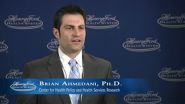(Press-News.org) In the year since the World Health Organization (WHO) was first notified of an outbreak of what proved to be Ebola virus disease in the west African country of Guinea, more than 24,000 cases have been reported and over 10,000 individuals have died - primarily in Guinea, Liberia and Sierra Leone. Moreover, countless non-Ebola deaths have occurred as a result of the closing of health systems in those countries, and an international aid effort has invested billions of dollars in control efforts.
In a paper published in the open-access journal PLOS Medicine, experts in global health from the Massachusetts General Hospital (MGH) Center for Global Health and the O'Neill Institute for National and Global Health Law at Georgetown University, write that, while the international response to the epidemic included unprecedented measures that appeared to be gaining control of the outbreak by the end of 2014, the past year has also revealed critical weaknesses in the global public health system.
"Had (the WHO and the United Nations) responded earlier and more effectively after the first signs of an uncharacteristic outbreak, it is likely that the number of lives lost, the impact on health infrastructure, and the magnitude of the eventual response could have been drastically diminished," the authors write. "It is incumbent upon the global public health community to identify gaps revealed during the early stages of the epidemic so that we improve our collective ability to detect and respond early to the inevitable next emergency disease."
Specific recommendations made by the authors - lead author Mark Siedner, MD, MPH, and Hilarie Cranmer, MD, MPH, MGH Center for Global Health; and Lawrence Gostin, JD, and John Kraemer, JD, MPH, O'Neill Institute - include the following:
Greater attention to the specific capabilities of health systems in affected localities when determining the presence of a public health emergency.
Adjustment of WHO criteria for public health emergencies of international concern to give greater weight to a country's need for international assistance, less to the potential for spread across borders, and the flexibility to tailor recommendations to the particular situation.
Greater involvement of local authorities, organizations, public health and community leaders to develop culturally appropriate measures and maintain public trust.
Providing sufficient resources - financial and personnel - to mount an adequate response, possibly through the establishment of a permanent global emergency fund and corps of health workers trained to respond to international crises.
Supporting the development of health systems in sub-Saharan Africa and other low-income countries capable of providing both the routine services required to maintain a population's health and an adequate initial response to public health emergencies.
In their conclusion, the authors note that the delayed response to the early stages of the epidemic illustrates "not only the danger posed by disease outbreaks in states with weak health systems but also their widespread impact in an increasingly globalized world. . . . The power of global health law and global health institutions will remain seriously unrealized and deeply compromised if the Ebola epidemic does not spur fundamental reform."
INFORMATION:
Massachusetts General Hospital, founded in 1811, is the original and largest teaching hospital of Harvard Medical School. The MGH conducts the largest hospital-based research program in the United States, with an annual research budget of more than $760 million and major research centers in AIDS, cardiovascular research, cancer, computational and integrative biology, cutaneous biology, human genetics, medical imaging, neurodegenerative disorders, regenerative medicine, reproductive biology, systems biology, transplantation biology and photomedicine.
NASA-NOAA's Suomi NPP satellite captured an image of the remnants of Tropical Cyclone Nathan over the southern Top End of Australia's Northern Territory on March 25.
On March 25, the Australian Bureau of Meteorology (ABM) issued a Severe Weather Warning for heavy rainfall for people in the Daly, Arnhem, Carpentaria and Gregory forecast districts of Top End. The Top End contains the region's capital city of Darwin, and is home to Kakadu National Park, the country's largest national park. For updated watches and warnings, visit: http://www.bom.gov.au/cyclone/.
When Suomi ...
Getting a good education may not improve your life chances of happiness, according to new mental health research from the University of Warwick.
In a new study published in the British Journal of Psychiatry, researchers from Warwick Medical School examined socioeconomic factors related to high mental wellbeing, such as level of education and personal finances.
Low educational attainment is strongly associated with mental illness but the research team wanted to find out if higher educational attainment is linked with mental wellbeing.
The team found all levels of ...
Mobile devices have a large number of different adjustable system settings whose energy impact can be difficult to understand for the average user, and even for the expert.
Some system settings have a direct and significant correlation with energy consumption, for example screen brightness and network connectivity. The energy impact of system settings and their combinations, such as the combination of roaming, high operating temperature, and bad signal strength, are much more difficult to predict. The research article by the Finnish computer scientists demonstrates that ...
An analysis conducted by researchers at the Johns Hopkins Center for a Livable Future (CLF) found that the risks of drinking raw (unpasteurized) cow's milk are significant. Consumers are nearly 100 times more likely to get foodborne illness from drinking raw milk than they are from drinking pasteurized milk. In fact, the researchers determined that raw milk was associated with over half of all milk-related foodborne illness, even though only an estimated 3.5% of the U.S. population consumes raw milk.
Based on their findings, the researchers discourage the consumption ...
DETROIT - Co-existing psychiatric illness should be considered in assessing hospital readmissions for three common medical conditions used by Medicare and Medicaid to penalize hospitals with "excessive" readmission rates.
That was the conclusion of a newly published collaborative study by 11 major U.S. healthcare providers - including Henry Ford Health System - affiliated with the nationwide Mental Health Research Network (MHRN).
The study is published in Psychiatric Services.
The subject of readmission rates has been of increasing concern to U.S. hospitals since ...
Scientists at Columbia University's Mailman School of Public Health report that children with autism spectrum disorder (ASD) were two-and-a-half times more likely to have persistent gastrointestinal (GI) symptoms as infants and toddlers than children with typical development. Results are published in JAMA Psychiatry.
The study is based on a large longitudinal survey of Norwegian mothers who were asked about their child's GI disturbances during the first three years of life. Questionnaires were completed when the children were 18 and 36 months of age.
The authors ...
Gastrointestinal symptoms reported by mothers were more common and more often persistent in the first three years of life in children with autism spectrum disorder than in children with typical development and developmental delay, according to an article published online by JAMA Psychiatry.
Autism spectrum disorders (ASDs) are characterized by problems in social communication and interaction, as well as restricted/repetitive behaviors. Medical and psychiatric conditions are frequently associated with ASD and among the most common are gastrointestinal (GI) symptoms and ...
A new analysis of surgical outcomes nationwide concludes that more use of minimally invasive surgery for certain common procedures can dramatically reduce post-operative complications and shave hundreds of millions of dollars off the nation's health care bill.
Results of the research, conducted by Johns Hopkins investigators and published March 25 in JAMA-Surgery, indicate that American hospitals collectively could prevent thousands of post-surgical complications and save between $280 million and $340 million a year by using more minimally invasive procedures instead ...
A small imaging study suggests prenatal exposure to polycyclic aromatic hydrocarbons (PAHs), the toxic air pollution caused in part by vehicle emissions, coal burning and smoking, may be bad for children's brains and may contribute to slower processing speeds and behavioral problems, including attention-deficit-hyperactivity-disorder (ADHD) symptoms, according to an article published online by JAMA Psychiatry.
PAHs are caused by the incomplete combustion of organic materials. In addition to outdoor air pollution, sources of indoor air pollution caused by PAHs can be cooking, ...
A variety of dialectical behavior therapy (DBT) interventions helped to reduce suicide attempts and nonsuicidal self-injury acts in a randomized clinical trial of women with borderline personality disorder who were highly suicidal, according to an article published online by JAMA Psychiatry.
DBT is a multicomponent therapy for individuals at high risk for suicide and for those with multiple severe mental disorders, particularly those who have marked impulsivity and an inability to regulate emotions. The components of DBT include individual therapy, group skills training, ...

